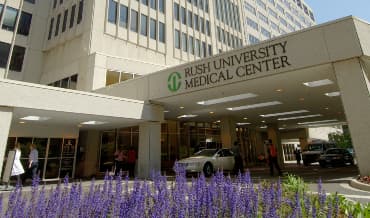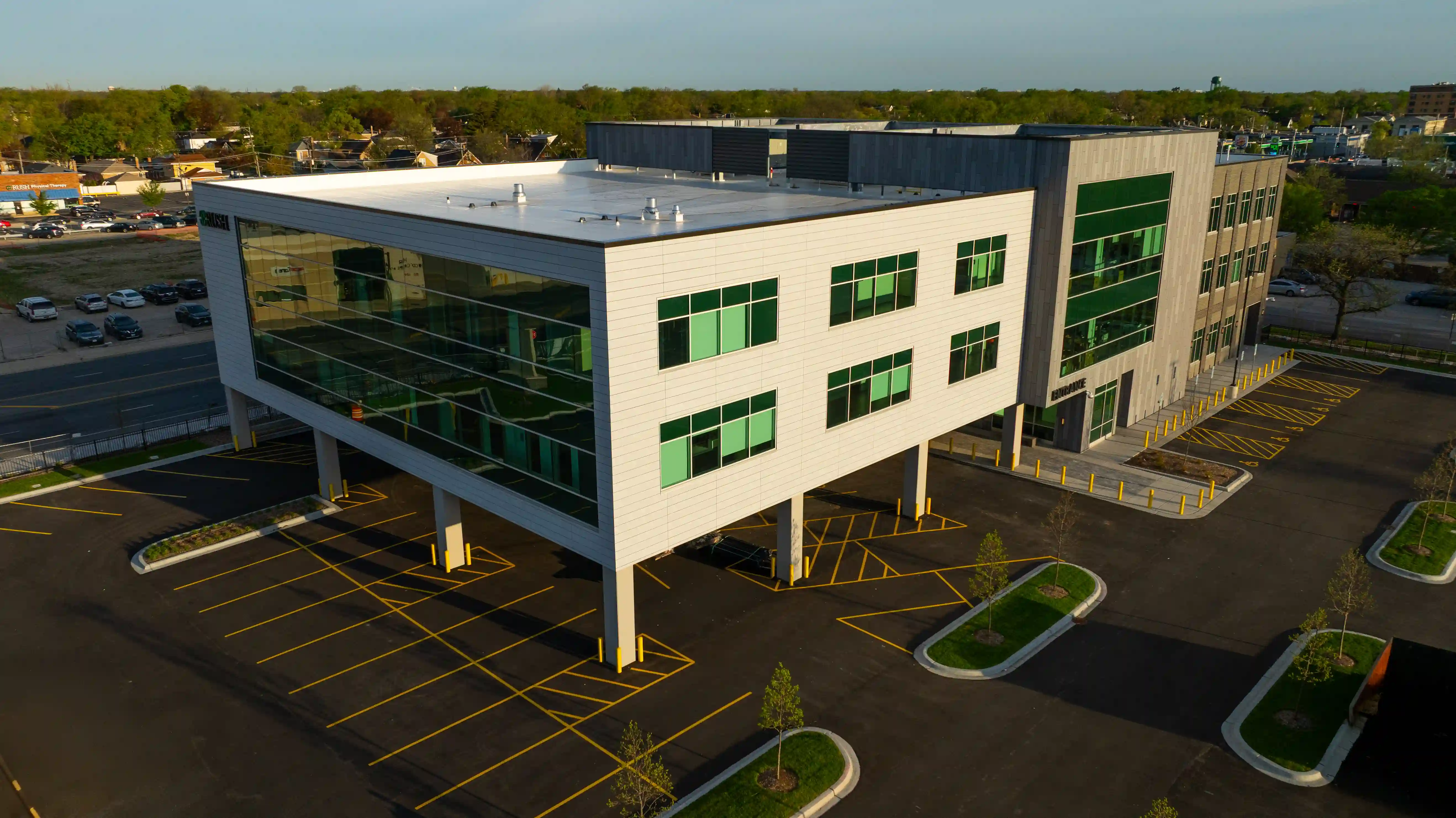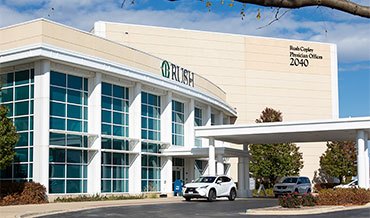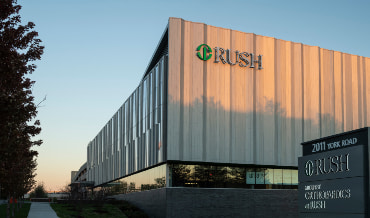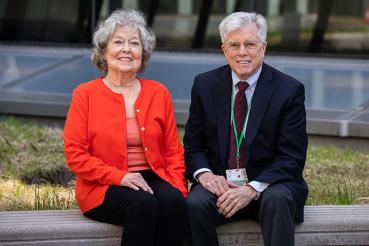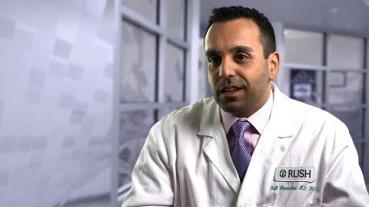A liver transplant is surgery that involves removing a liver that no longer functions properly due to diseases, such as hepatitis B, end-stage liver disease and liver cancer. The surgeon then replaces the organ with a healthy liver from a donor.
This is a lifesaving procedure. Despite advances in treatment, a liver transplant, also sometimes called hepatic transplantation, remains the only hope for many people who have end-stage liver disease.
How a Liver Transplant Works at Rush
At Rush, we understand how challenging it can be to hear that you have severe liver problems that may require liver transplant surgery. Our team makes both your medical and emotional needs a top priority. We'll work with you and your family to help improve your quality of life before surgery and get back to life afterward.
When you first contact us, we’ll make an appointment for a liver transplant evaluation within two weeks. We'll answer your questions about medications, diet and insurance.
One of your care team’s top priorities is to place you on a waiting list for a new liver as quickly as possible if you qualify.
Your surgeon will discuss all of your options and risk factors concerning your liver transplant. And you will meet with members of the entire team dedicated to your care, which can include a pre-transplant nurse coordinator, hepatologist, social worker, pharmacist, nutritionist and financial coordinator. While you are waiting for a new liver, your care team will monitor you closely and help you stay as comfortable and healthy as possible, and they'll provide you with treatment options to help ease your symptoms.
We are available 24 hours a day to respond to offers of organs for you. Once Rush gets a liver for you, you will get a call to come in for your transplant surgery. The surgery usually takes about four to six hours. You’ll then transfer to the intensive care unit to recover. Patients generally spend about a week or two in the hospital. Your liver transplant specialist will advise you on how to continue recovery at home. Most patients can get back to work after about a month or two, depending on how physically demanding their job is.
Those who have successful liver transplants usually get back to fairly normal lives with few restrictions. They may need to take medications, but the vast majority of patients are on far fewer medications after liver transplant than they were before. About two years after transplant, they typically only have one or two doctor visits a year.
How the Waiting List for a Liver Transplant Works at Rush
To get on the waiting list for a liver transplant, you’ll first go through an evaluation. Our specialists use this evaluation to find out two things: First, they see if you need a liver transplant to save your life. Second, they’ll make sure you’re a good candidate for the surgery, meaning there’s a likelihood you’ll have a good outcome and long-term survival.
There are many possible conditions that Rush liver transplant specialists look for that indicate you actually need a liver transplant. Five of the most common include the following:
- Variceal bleeding: Patients with bad livers can get giant, dilated veins in their esophagus or stomach as a complication of cirrhosis, which is serious liver damage. The dilated veins aren't necessarily a health problem by themselves, but they can rupture, which can lead to dangerous bleeding.
- Hepatic encephalopathy: When the liver gets very sick, it loses the ability to filter toxins. These can build up in the brain and cause serious confusion.
- Ascites: This is a buildup of water in the belly that shows that liver function is very compromised.
- Hepatocellular carcinoma: This is liver cancer that almost only happens to people who have cirrhosis.
- Poor blood test results: Lab tests can measure the function of the liver by looking at your blood, and they can indicate whether the liver is highly compromised.
To find out if you’re a good candidate for liver transplant, the team will carry out an evaluation with you at our comprehensive liver transplant clinic. During your evaluation you’ll have the following tests:
- Blood work
- A CT scan of your abdomen
- A chest X-ray
- An echocardiogram of your heart
- A stress test of the heart in most cases
The care team will want to make sure that you are stable enough to have transplant surgery and that you’ll have a high chance of a good outcome and good life expectancy.
Social services will also evaluate your support at home for post-transplant care, whether you’ll be able to keep up with your medications, and any possible lifestyle risks such as drug or alcohol use.
There are a few factors that can disqualify a patient from being a good liver transplant candidate, including the following:
- Cancer that spread to the liver from somewhere else in the body, including the lungs, breast, pancreas or colon.
- A history of heart attacks or poor heart health.
- A history of severe lung disease.
- Age: There is no firm age limit for transplantation, but very few are performed on patients over age 75.
- Frequent alcohol or drug use.
Your individual case will be discussed at a conference with physicians from many specialties to explore all of your options for care.
If your liver transplant specialist finds that you need a liver transplant and are a good candidate, they’ll work to place you on the waiting list within about 30 days. When you are placed on the waiting list, you will receive a letter in the mail.
Patients get priority on the liver transplant waiting list based on their MELD score, which stands for “model of end-stage liver disease.” This score is calculated through blood test results. Patients with a high score are very sick and have the highest priority on the waiting list, while a low score means that a patient will have to wait longer for a transplant. The score gets recalculated as new blood tests are taken, so your place on the list may change as you wait.
Because priority on the waiting list is based on this MELD score, your wait time can vary. Some people spend a day on the waiting list, while others wait for a year. If you have questions about how long you’ll be on the list, your liver transplant specialist will discuss your individual case with you.
Start the Transplant Process from Home
You can begin your liver transplant care at Rush from home with a virtual transplant intake visit. During a video intake visit, you’ll meet with a knowledgeable nurse navigator who will take time to understand your medical history, explain the transplant process and answer any questions you have. After your virtual intake visit, your nurse navigator may schedule the in-person evaluation appointments you need to be placed on the transplant list.
Same and next-day appointments are available anywhere in Illinois. Your first video visit with a nurse navigator is available at no charge.
Rush Excellence in Liver Transplant Surgery
- Excellent outcomes: Our liver transplant surgeons and specialists are highly experienced in the care of complex liver transplants and our patients. Several have been named Top Doctors in the city by Chicago magazine. They have a one-year liver transplant survival that is higher than the national average and among the highest in the Chicago area, according to the Scientific Registry of Transplant Recipients.
- A team approach: While you are on the waiting list for a liver transplant, you’ll get a care team that includes our surgeons, hepatologists, a social worker, a psychologist, a pharmacist, a nutritionist and a nurse coordinator. They’ll collaborate together, and with you, to create a personal treatment plan.
- Second opinion services: Rush offers second opinion services to help you explore all possible treatment options, including liver transplant, for advanced liver disease. Call us at (312) 942-5483 to get started.
- Follow-up care where — and when — you need it: A liver transplant surgery is a major procedure that requires presurgical and lifelong follow-up care. We offer liver transplant care at a number of convenient locations throughout Chicago and the suburbs, including Oak Brook, Aurora/Fox Valley, Bourbonnais, Libertyville and New Lenox.
- Help through social and emotional support: A liver transplant is a life-changing event. At Rush, you have access to social workers and psychiatrists. We also have a liver transplant support group that helps you connect with others in similar situations to learn and share coping strategies, feelings and concerns about difficult challenges along your transplant journey.
- Research and clinical trials: Our liver care physicians teach and speak all over the world at liver disease conferences, and they teach other doctors about new techniques and procedures for liver care. We have one of the deepest research programs in Chicago with access to ongoing clinical trials for alcohol-related hepatitis, nonalcoholic fatty liver disease and nonalcoholic steatohepatitis. This means you’ll have care options that you may not find anywhere else.
FAQs About Liver Transplant Surgery at Rush
Liver transplant is a major surgery, and as with any surgery, there are possible complications that surgeons talk about with patients. For example, a small number of patients could have bleeding, infection and damage to tissues near the site of the procedure. Your care team at Rush will monitor your progress and address any issues that may come up.
Some liver transplant surgeries are not successful — less than 10% of liver transplants at Rush. Still, the prognosis is much better than not getting liver transplant surgery for those with serious liver disease, which carries only a 50% survival rate after two years and severe sickness.
The one-year survival rate for patients who get their liver transplants at Rush is over 90%. This is higher than the national average. For context, patients who need liver transplants and do not get them have only about a 50% survival rate within two years and often spend that time living with serious illness and discomfort.
Immediately after the procedure, you’ll go to the intensive care unit to begin recovery. Usually, patients spend about a week or two in the hospital following liver transplant surgery. Your physician will give you instructions for continuing recovery at home. You’ll likely be able to go back to work within a month or two, depending on how active your job requires you to be.
No. While alcohol certainly can cause liver problems, the vast majority of people with liver problems, 85% to 90%, actually don't drink alcohol too much or at all. There are many other possible causes of liver problems that might require a liver transplant.
No, it is not advisable to drink alcohol because it can compromise the new liver, especially soon after the surgery. Your physician can go over all of the dietary and lifestyle changes you may need to make.




